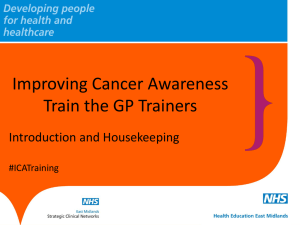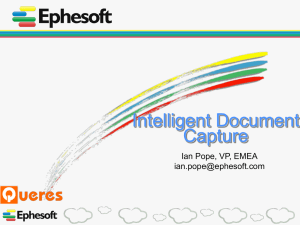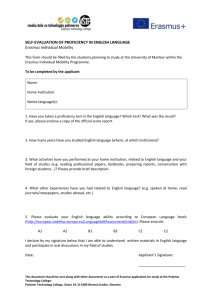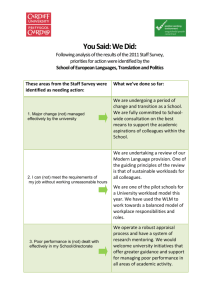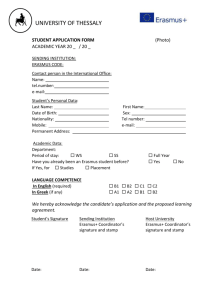Sixth Meeting 2014 - European School Psychology Centre for
advertisement
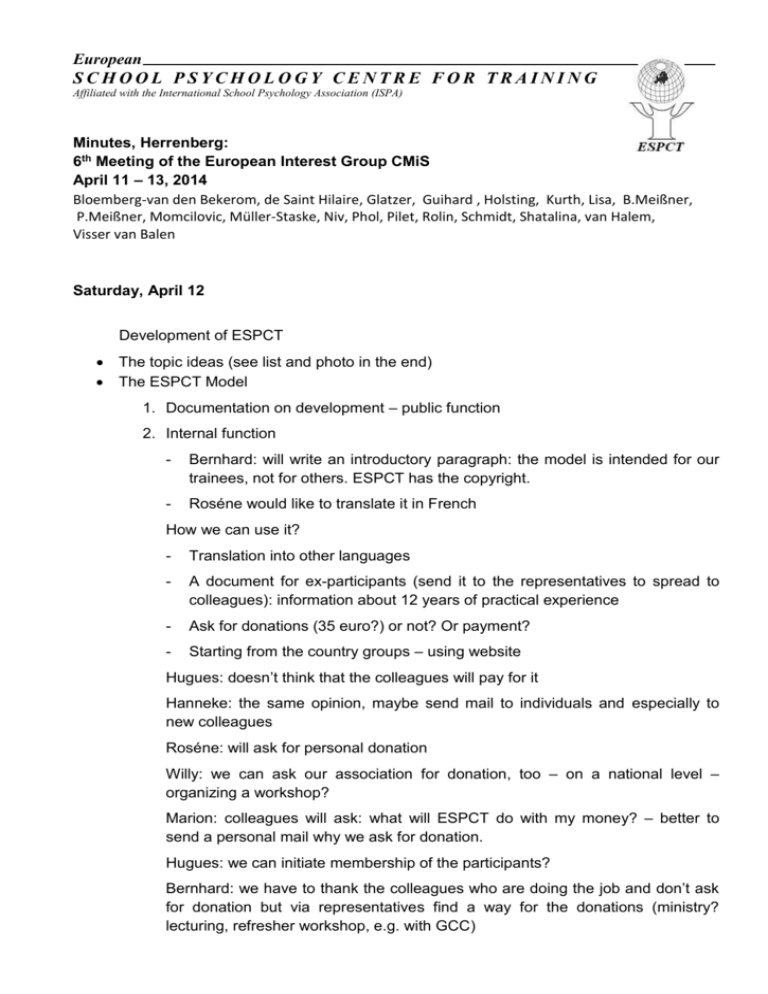
European SCHOOL PSYCHOLOGY CENTRE FOR TRAINING Affiliated with the International School Psychology Association (ISPA) Minutes, Herrenberg: 6th Meeting of the European Interest Group CMiS April 11 – 13, 2014 Bloemberg-van den Bekerom, de Saint Hilaire, Glatzer, Guihard , Holsting, Kurth, Lisa, B.Meißner, P.Meißner, Momcilovic, Müller-Staske, Niv, Phol, Pilet, Rolin, Schmidt, Shatalina, van Halem, Visser van Balen Saturday, April 12 Development of ESPCT The topic ideas (see list and photo in the end) The ESPCT Model 1. Documentation on development – public function 2. Internal function - Bernhard: will write an introductory paragraph: the model is intended for our trainees, not for others. ESPCT has the copyright. - Roséne would like to translate it in French How we can use it? - Translation into other languages - A document for ex-participants (send it to the representatives to spread to colleagues): information about 12 years of practical experience - Ask for donations (35 euro?) or not? Or payment? - Starting from the country groups – using website Hugues: doesn’t think that the colleagues will pay for it Hanneke: the same opinion, maybe send mail to individuals and especially to new colleagues Roséne: will ask for personal donation Willy: we can ask our association for donation, too – on a national level – organizing a workshop? Marion: colleagues will ask: what will ESPCT do with my money? – better to send a personal mail why we ask for donation. Hugues: we can initiate membership of the participants? Bernhard: we have to thank the colleagues who are doing the job and don’t ask for donation but via representatives find a way for the donations (ministry? lecturing, refresher workshop, e.g. with GCC) Bill: the context of trainings change during the years so much and we need to update it all the time (marketing). Marion: support from the companies? (save school) Shula: insurance companies? Bill: we can find some professionals for funding a donations Consequences of Erasmus+ - Bernhard - Only schools with identity code can send participants to the courses. They have to go through a registration process. Most of psychologists are not part of a school but work on higher level. - there is only one deadline per year in March to apply - we can try to make contacts with corresponding persons in EU platforms in each country to explain what is the problem, contact the ministries… - for advanced course you don’t have to wait 2 years now. - Organizers can only get €350 for a five-day course as seminar fee per participant, €250 less than from COMENIUS before. Alternative: 1. Some participant can ask their employers for 150 euro to support 2. Only 2 trainers (for 20 participants) – but that would make development of courses slower Group1 – France – in catholic school board is possible to find a way and pay 150 euro per participant Group 2 – €150 each participant can pay; donations from government; if there are less then 15 applicants then we cancel the training; only 3 trainers Group 3 – €150 participants pay; explain why they have to pay - that the trainers are paid less; 3 international paid + one national not paid; use deposit; needs nice locations and more social programs; bonus for the participant who get new colleagues Group 4 – €250 paid by participants; having trainings in low season; 350 deposit and then get 100 back. Negotiating with countries with low income. * In some regions educ minist. will pay (Marion) Can we have influence on ERASMUS+? - ERASMUS+ ESPCT will support colleagues who will apply for funds through a school. In future we will ask for €250 on top of the maximum grant for seminar fee from ERASMUS+ (= €350). This will be done on a negotiation basis: Howe much are employers or SPs themselves prepared and able to pay. There could be different sources for paying the additional amount. When more than one from an organization apply for funds they can get a reduction on the additional payment. They should know that they pay for highly experienced trainers. - ERASMUS ++ Bernhard and Bill will suggest a letter to stakeholders of ERASMUS+ (ERASMUS+ agencies, SP associations, ministries, politicians) to change the regulation that only schools can apply for funds not school administrations on higher level where SPs usually work. This letter will be sent to the participants of this meeting and those who could not come. Perhaps more course organizers are interested in the same changes as ESPCT? Ola will ask Marianne Kant-Schaps about persons in Brussels to contact about change of regulations for ERASMUS+ Development of trainings: Experiences of trainers, show very successful elements or elements further develop - Main courses are familiar to everyone - The prevention course will be offered again in order to develop it further. - Only school psychologists? More arguments and votes were brought forward for sticking to school psychologists (different roles, different techniques and tasks are necessary for different roles). The purpose of our foundation is to promote cooperation between school psychologists When trainings and workshops are offered for whole schools it is useful to have participants with different functions in these schools National courses Will be more important to raise surplus for meetings of this group. Memebers of the Advisory Board will play an important role in this. Different organizational formats in different countries depending on negotiation Half week / full week; different participants roles; international trainers or national trainers. - In France in Catholic schools no prevention training but basic trainings SP 5 days, headmasters 1 day information 3 new trainers who will run basic course after Catherine’s and Jean-Luc’s retirement multi-professional teams on local level are organized There is a central team on national level 120 SPs from 150 are trained Supervision is asked for and offered In future participants should get ESPCT certificates In public schools interest in crisis intervention is low. Lack of money results in priority of other topics for trainings For French colleagues interested English language is a problem other problem: medical doctors are in charge Roséne – survey: crisis intervention trainings are giving from national inspectors (working in couples), there is no psychologist in their teams. They want more trainings. - In Netherland workshops to inform about the ESPCT courses are the best way SCm is not offered, because schools have to choose between three anti bullying approaches the government offers. maybe national courses in English can be offered - Germany: many courses for school crisis teams, care for school crisis teams , supervision for acting in suicide cases, practice days for experienced colleagues (GCC), courses for headmasters, conflict management , blended learning tool for threat assessment - How far do we go into other the topics? - What courses shall we offer? - Can we raise money for ESPCT from those courses? - A group of colleagues want to offer acourse on CCC. ESPCT offered help but they must take the organizational risk. - Everyone who is able to get in contact with ministries of education and schoolboards, should use this. Additional courses: SCm, Creative Cards, Client Centred Consultation (CC) etc. Bernhard reports on different additional course - SCm courses organized by Bernhard in Bavaria render some financial contribution to ESPCT - Creative Cards run by Shula and Yuda rendered 10% of income to ESPCT Sunday, April 13, 2014 The role of the Trainers 1. Applicant participated in basic ESPCT course or more courses 1.1 or in authorized national course 1.2 or helped as presenter and trainer in training on international or national basis 2. Experience with interventions trained 3. ESPCT certificate when the same program as in international courses 4. Should teach CMiS every two years. 5. Be at CMiS meetings. 6. Be at ESPCT courses now and then. 7. Accept agreement between national trainers and ESPCT 8. Could participate unpaid at international courses 9. Under which conditions can authorization be revoked? Who will decide? 1. Group: - take holidays to do ESPCT trainings - having ESPCT certificates is important 2. Group: - supervision/ intervision - commission of 1 international trainer + 3-4 colleagues from authorized ESPCT national trainers should decide who can be a national trainer – the ESPCT board can do that 3. Group - Point 2 “Experience in interventions” means to be involved in crises, using some of the tools from courses - Point 3 – There should be ongoing experience with running trainings which may be parts of trainings (tools and strategies) - Point 7: inform ESPCT Board of the trainings – during the CMiS meetings – send evaluation reports to ESPCT Board We don’t want the control of colleagues of commissions . All ESPCT trainers should have been to basic and advanced course All trainings of ESPCT trainers should meet high standards: be addressed to head heart and hand European CMiS core group: “Advisory Board” It consists of the authorized National and International Trainers and representatives of CMiS groups in different countries and states. The members give advice and support the development of ESPCT and CMiS in their countries and in Europe in collaboration with the development in the world. Tasks - The representatives get all mail addresses of former trainees in their country from ESPCT and they can send infos to them e.g. about the meeting in Herrenberg and the ESPCT Model - They promote communication among the CMiS group in their country - Organize practice meetings of CMiS tools and strategies - PR at country conferences - Contact with ministries and school psychology associations and promote national or regional courses. - Attend meetings invited by ESPCT Future meetings - brainstorm: - Organization of a Conference with researchers in the field - Austria Red Cross organizes annual conference on CM in Innsbruck– present ESPCT there? - Internet conference: skype 4 hours - 4 hours computer meeting: Doby connect meeting software - Meeting in Samara: Russian colleagues will ask ministry for supporting a meeting - Meetings at Dieter’s home - Coop Project: for schools “safe schools - prevention on suicide” Ideas Who knows a lawyer who can give advice whether the term “organization” excludes in Erasmus+ all entities but schools. Who can and is willing to contribute to a newsletter for the CMiS Euro Network? Most important ideas according to participants Who said she could find out more details about EuroPsy accreditation of trainings? Who is willing to translate the ESPCT Model into other languages? Everybody consented to support contact with ministries for support of national ESPCT CMiS trainings for changing the regulations for Erasmus+ We should consider an update training (e.g. with new elements like the GCC) Who would like to help with an interactive website? Contact Dieter Could we consider a CMiS meeting with relevant scientists? Which researchers could be suggested? Could we consider as cooperation project among schools concerning best practice for establishing safe schools or dealing with suicide (prevention). Who knows school which would be interested (see overview for such a project last page) More ideas Formal feedback questionnaire: send to others Supervision and intervision are important for crisis managers Connect with Tübingen competence centre Invite representatives of ministries to discuss further development of CMiS Train school safety teams and school crisis teams Train principals for CMiS This could be done through ERASMUS+ Shula will find out more details about an inoculation training for teachers performed in Israel Get ISBN number for the ESPCT model Consider membership for ESPCT trainees? Thank former participants for the work they do Offer supervision on suicide cases on local/area level There are APPs for Psychological First Aid Resilience building Life armor APPs connect suicidal persons with their therapist Krisen Kompass (Schweiz)
